|
Flames consumed a man at the foot of Riga's Freedom Monument on April 13, 1969. Like the university student Jan Palach, who on January 16, 1969, set himself on fire in central Prague in protest of the occupation of Czechoslovakia, Ilya Rips set himself on fire in central Riga.
Ilya Rips was considered a genius and accepted into the University of Latvia at the age of 15 without having to first pass entrance examinations. On April 13, 1969, Rips protested against the USSR's aggressive policy. In his opinion, it was not acceptable that people kept silent. He held a poster with the inscription “I am protesting the occupation of Czechoslovakia” and set himself on fire in front of the Freedom Monument. The poster - seen at the beginning of this exhibit - was torn from Rips' hands by some passing sailors. The flames were extinguished and Rips was taken to the chambers of the Committee for State Security (KGB). An investigation followed and Rips was not allowed to finish his studies at the university.
News of Rips' self-immolation reached the Western media. On April 14, 1969, several fellow Jewish students in Riga signed a public letter to students worldwide in support of Rips.
The Committee of State Security of the Latvian SSR did not indict Ilya Rips. But on June 13, 1969, it decided to bring a criminal case against Rips, and the court sentenced him to forced psychiatric treatment. Ilya Rips currently works at the Holon Academic Institute of Technology in Israel.
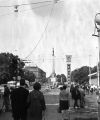
The Freedom Monument in the 1960s. Photo by Metsnyankin. Latvian State Archive of Film, Photo and Audio Records, arh. nr. 7271- I.
|
The Freedom Monument in the 1960s. |
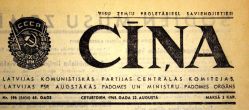
A report by Soviet news agency TASS about the invasion of Czechoslovakia. Readers in Latvia read this report in the Latvian Communist Party newspaper “Cina” only on August 22, 1968.
|
A report by Soviet news agency TASS about the invasion of Czechoslovakia. Readers in Latvia read this report in the Latvian Communist Party newspaper “Cina” only on August 22, 1968. |

Ilya Rips, a student at the State University of Latvia. Rips attempted to set fire to himself by the Freedom Monument in Riga on April 13, 1969, in protest of the occupation of Czechoslovakia. Photo of Ilya Rips shortly after his arrest.
State Archives of Latvia, 1986-1-45165-2, p -108. o.p. |
Photo of Ilya Rips shortly after his arrest. |

Ilya Rips' statements about the Communist Party, confiscated by the KGB of the Latvian SSR in 1969:
“...influence from a literary discussion. From that - my further conclusions about the CPSU [Communist Party of the Soviet Union]. The class structure of the Soviet nation. Power belongs to a relatively small group of mid and higher level superiors. They select the leading institutions. They don't so much determine the policies, but rather the actual implementation of policies...”
State Archives of Latvia, 1986-1- 45165- 2, p. 175.
|
Ilya Rips' statements about the Communist Party, confiscated by the KGB of the Latvian SSR in 1969:
“...influence from a literary discussion. From that - my further conclusions about the CPSU [Communist Party of the Soviet Union]. The class structure of the Soviet nation. Power belongs to a relatively small group of mid and higher level superiors. They select the leading institutions. They don't so much determine the policies, but rather the actual implementation of policies...” |

Cover sheet from the criminal case brought by the State Security Committee (KGB) of the Latvian SSR against Ilya Rips. Rips was prosecuted for his protest of the occupation of Czechoslovakia.
State Archives of Latvia, 1986-45165-1-cover sheet. |
Cover sheet from the criminal case brought by the State Security Committee (KGB) of the Latvian SSR against Ilya Rips. Rips was prosecuted for his protest of the occupation of Czechoslovakia. |
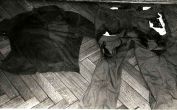
Ilya Rips' burned clothing after his attempted self-immolation on April 13, 1969.
State Archives of Latvia, 1986 -1- 45165- 2,p. 49 b.
| Ilya Rips' burned clothing after his attempted self-immolation on April 13, 1969. |

Ilya Rips' statements about the Communist Party, confiscated by the KGB of the Latvian SSR in 1969:
“...influence from a literary discussion. From that - my further conclusions about the CPSU [Communist Party of the Soviet Union]. The class structure of the Soviet nation. Power belongs to a relatively small group of mid and higher level superiors. They select the leading institutions. They don't so much determine the policies, but rather the actual implementation of policies...”
State Archives of Latvia, 1986-1- 45165- 2, p. 175. |
Ilya Rips' statements about the Communist Party, confiscated by the KGB of the Latvian SSR in 1969:
“...influence from a literary discussion. From that - my further conclusions about the CPSU [Communist Party of the Soviet Union]. The class structure of the Soviet nation. Power belongs to a relatively small group of mid and higher level superiors. They select the leading institutions. They don't so much determine the policies, but rather the actual implementation of policies...”
|

It was decided at the April 18, 1969, meeting of the LCP Central Committee bureau that the university's rector and Communist Party committee leader must be strongly reproached for their weak knowledge of the political mood of the students. The Bureau indicated that the leadership of the university must eradicate even the smallest expressions of bourgeois ideology and must raise students to be patriots of the Soviet system and champions of proletarian internationalism. The Bureau instructed the party committee of Riga's Kirov district to intensify party control of teaching staff. The Central Committee of the Communist Youth Organization was also instructed to instill political consciousness in all students.
State Archives of Latvia, PA-101- 33-36, pp. 117.
|
It was decided at the April 18, 1969, meeting of the LCP Central Committee bureau that the university's rector and Communist Party committee leader must be strongly reproached for their weak knowledge of the political mood of the students. The Bureau indicated that the leadership of the university must eradicate even the smallest expressions of bourgeois ideology and must raise students to be patriots of the Soviet system and champions of proletarian internationalism. The Bureau instructed the party committee of Riga's Kirov district to intensify party control of teaching staff. The Central Committee of the Communist Youth Organization was also instructed to instill political consciousness in all students. |

After the arrest of Ilya Rips, the KGB of the Latvian SSR began to concentrate on his reeducation, or “re-nurturing”. For purposes of handwriting analysis Rips had to write a statement in which he explained that he was protesting against the Nazi occupation of Czechoslovakia during World War II instead of the Soviet occupation of Czechoslovakia in 1968. The KGB did not want him to rewrite the “dangerous” text on his protest poster.
State Archives of Latvia 1986-1-45165-2, p. 138.
|
After the arrest of Ilya Rips, the KGB of the Latvian SSR began to concentrate on his reeducation, or “re-nurturing”. For purposes of handwriting analysis Rips had to write a statement in which he explained that he was protesting against the Nazi occupation of Czechoslovakia during World War II instead of the Soviet occupation of Czechoslovakia in 1968. The KGB did not want him to rewrite the “dangerous” text on his protest poster. |

The exercise yard at the Latvian SSR KGB's isolation ward. This is the only place where Ilya Rips and other prisoners could get a glimpse of daylight.
Latvia State Archive of Film, Photography and Audiovisual Documents, arh. nr. 127500N. Photo by B. Kolyesnikov. |
The exercise yard at the Latvian SSR KGB's isolation ward. This is the only place where Ilya Rips and other prisoners could get a glimpse of daylight. |
Ivan Yahimovich, who supported the leader of the Czechoslovak Communist Party Alexander Dubchek and criticized the invasion of Czechoslovakia, can most certainly be called a dissident. By the late 1960s Yahimovich understood that the USSR's policies were in reality far from the socialist ideals it professed.
The USSR dissident movement hit a peak in 1965-1967. Those with differing opinions no longer hid underground, but openly stated their opinions. In turn, repressions against dissidents created new protests about the disregard for human rights. Ivan Yahimovich found others who shared his views. He stood up for human rights in the USSR and on January 22, 1968, wrote a letter to Mikhail Suslov, the chief ideologist of the CPSU Central Committee. In his letter he demanded the right to an open public trial for dissidents and writers. Next he wrote a letter together with the well-known USSR dissident Piotr Grigorenko in support of the Czechoslovak Socialist Republic's Central Committee. In 1969 he wrote a public letter of protest against the occupation of Czechoslovakia. In 1968 Yahimovich was expelled from the CPSU and fired from his job as director of a kolkhoz.
Beginning in 1967 dissidents were not only tried, but with the support of the CPSU they were placed in special psychiatric hospitals supervised by the repressive regime. Ivan Yahimovich also became one of the victims of this criminal psychiatry.
In the late 1980s Yahimovich became involved in the mass movement to restore Latvia's independence. He was a board member of the Popular Front (Tautas fronte) and a candidate in the 1990 Latvian SSR Supreme Council (parliament) elections.

Ivan Yahimovich. A Latvian dissident and historian, who from 1968-1969 protested the occupation of Czechoslovakia.
International Society “Memorial” Russian archives on USSR dissidents, photo collection. |
Ivan Yahimovich. A Latvian dissident and historian, who from 1968-1969 protested the occupation of Czechoslovakia. |

Cover sheet from the criminal case brought against Ivan Yahimovich. He was prosecuted for defending human rights in the USSR and for condemning the occupation of Czechoslovakia.
State Archives of Lavia 1986 - 2-10997-1, cover sheet. |
Cover sheet from the criminal case brought against Ivan Yahimovich. He was prosecuted for defending human rights in the USSR and for condemning the occupation of Czechoslovakia. |
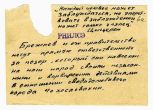
Statement written and distributed in Latvia by Ivan Yahimovich condemning the occupation of Czechoslovakia:
“Anyone can make mistakes, but only an idiot persists in his error.” (Cicero) Due to his illegal and barbaric actions against the freedom-loving people of Czechoslovakia, Brezhnev [General Secretary of the CPSU Central Committee] and his government are directly responsible for the shame inflicted upon our people.”
State Archives of Latvia 1986-2-10997-1, p. 6 a. |
Statement written and distributed in Latvia by Ivan Yahimovich condemning the occupation of Czechoslovakia:
“Anyone can make mistakes, but only an idiot persists in his error.” (Cicero)
Due to his illegal and barbaric actions against the freedom-loving people of Czechoslovakia, Brezhnev [General Secretary of the CPSU Central Committee] and his government are directly responsible for the shame inflicted upon our people.”
|

Text of the samizdat (Russian: self-published and self-distributed underground literature and media) statement written by Ivan Yahimovich in 1968 in public protest of the occupation of Czechoslovakia. Dissidents in the USSR illegally copied and distributed Yahimovich's statement.
Yahimovich spoke not only for himself, but also for other dissidents and defenders of human rights in the USSR when he demanded:
“We repeat: Come to your senses!
We repeat: Hands off the CSSR!
We repeat: Freedom for political prisoners!
We repeat: Yes to Leninism, no to Stalinism!”
International Society “Memorial” Russian archives on USSR dissidents, 155.f., Ivan Yahimovich's case. |
Text of the samizdat (Russian: self-published and self-distributed underground literature and media) statement written by Ivan Yahimovich in 1968 in public protest of the occupation of Czechoslovakia. Dissidents in the USSR illegally copied and distributed Yahimovich's statement.
Yahimovich spoke not only for himself, but also for other dissidents and defenders of human rights in the USSR when he demanded:
“We repeat: Come to your senses!
We repeat: Hands off the CSSR!
We repeat: Freedom for political prisoners!
We repeat: Yes to Leninism, no to Stalinism!”
|

“To the citizens of the Soviet Union”, an appeal written by Ivan Yahimovich and Piotr Grigorenko. Published in the February 28, 1969, issue of the illegal USSR dissident publication “Chronicle of Current Events”.
“...The greatness of a nation is not dependent on the strength of its military, which has attacked a small freedom-loving nation, but in its spiritual strength. Are we really going to stand back and watch in silence as our brothers perish? ...We appeal to all Soviet citizens to be careful and cautious and to use all legal means available to facilitate the removal of Soviet military forces from Czechoslovakia and to cease the Soviet Union's interference in Czechoslovakia's internal affairs! That is the only way to renew the friendship between our countries....”
International Society “Memorial” Russian archives on USSR dissidents, 153. f., Chronicle No. 6, 1969, February 28, 1969.
|
“To the citizens of the Soviet Union”, an appeal written by Ivan Yahimovich and Piotr Grigorenko. Published in the February 28, 1969, issue of the illegal USSR dissident publication “Chronicle of Current Events”.
“...The greatness of a nation is not dependent on the strength of its military, which has attacked a small freedom-loving nation, but in its spiritual strength. Are we really going to stand back and watch in silence as our brothers perish? ...We appeal to all Soviet citizens to be careful and cautious and to use all legal means available to facilitate the removal of Soviet military forces from Czechoslovakia and to cease the Soviet Union's interference in Czechoslovakia's internal affairs! That is the only way to renew the friendship between our countries....” |

Piotr Grigorenko (1907-1987). A fellow dissident of Ivan Yahimovich, seen here shortly before his arrest, protesting the occupation of Czechoslovakia.
Piotr Grigorenko was a major-general in the Soviet army and a leader of USSR dissidents in the late 1960s. Yahimovich was arrested on March 24, 1969, and Grigorenko was arrested on May 7 of that same year. He was also placed under forced psychiatric treatment, since that was the only way to silence a person who also protested the arrest of Yahimovich.
International Society “Memorial” Russian archives on USSR dissidents, photo collection.
|
Piotr Grigorenko (1907-1987). A fellow dissident of Ivan Yahimovich, seen here shortly before his arrest, protesting the occupation of Czechoslovakia.
Piotr Grigorenko was a major-general in the Soviet army and a leader of USSR dissidents in the late 1960s. Yahimovich was arrested on March 24, 1969, and Grigorenko was arrested on May 7 of that same year. He was also placed under forced psychiatric treatment, since that was the only way to silence a person who also protested the arrest of Yahimovich. |

A notice signed on April 21, 1969, by Imants Dekðenieks, a foreign affairs commentator for the Latvian SSR Cabinet of Ministers Radio and Television Broadcast Committee. The notice states that on March 7, 1969, the radio station “Voice of America” broadcast (in the Latvian language) information about I. Yahimovich and P. Grigorenko's appeal “To the citizens of the Soviet Union”. Both dissidents appealed to listeners/readers that Soviet citizens have not only a right, but an obligation to tell that the Kremlin made a tragic mistake. The mistake could only be corrected by the evacuation of military troops from Czechoslovakia.
The “Voice of America” broadcast was heard by people in Latvia in spite of the fact that from August 1968 until the late 1980s all broadcasts from Western media were scrambled by special equipment located at Soviet military bases in Latvia.
State Archives of Latvia 1986-2-10977-2, pp. 163, 167.
|
A notice signed on April 21, 1969, by Imants Dekðenieks, a foreign affairs commentator for the Latvian SSR Cabinet of Ministers Radio and Television Broadcast Committee. The notice states that on March 7, 1969, the radio station “Voice of America” broadcast (in the Latvian language) information about I. Yahimovich and P. Grigorenko's appeal “To the citizens of the Soviet Union”. Both dissidents appealed to listeners/readers that Soviet citizens have not only a right, but an obligation to tell that the Kremlin made a tragic mistake. The mistake could only be corrected by the evacuation of military troops from Czechoslovakia.
The “Voice of America” broadcast was heard by people in Latvia in spite of the fact that from August 1968 until the late 1980s all broadcasts from Western media were scrambled by special equipment located at Soviet military bases in Latvia. |

Ivan Yahimovich's samizdat essay “In Place of the Final Word”, illegally distributed by Soviet dissidents. Yahimovich wrote this essay shortly before his arrest on March 24, 1969. In it he also turns to Czechoslovak Communist Party leader Alexander Dubcek with the reminder that on August 25, 1968, seven people gathered in Moscow's Red Square to demonstrate against the occupation of Czechoslovakia. Yahimovich wrote that he himself was not able to take part in the demonstration, but that he supported Dubcek and would always do so as long as he continued to serve his people: “Be strong! The sun will rise!”
International Society “Memorial” Russian archives on USSR dissidents, 155. f., Ivan Yahimovich case.
|
Ivan Yahimovich's samizdat essay “In Place of the Final Word”, illegally distributed by Soviet dissidents. Yahimovich wrote this essay shortly before his arrest on March 24, 1969. In it he also turns to Czechoslovak Communist Party leader Alexander Dubcek with the reminder that on August 25, 1968, seven people gathered in Moscow's Red Square to demonstrate against the occupation of Czechoslovakia. Yahimovich wrote that he himself was not able to take part in the demonstration, but that he supported Dubcek and would always do so as long as he continued to serve his people: “Be strong! The sun will rise!” |

The February 19, 1969, appeal by Eiþens Kakitis (an investigator in Riga's Lenin district prosecutor's office) to Latvian SSR KGB director Longin Avdyukevich regarding the addition of Ivan Yahimovich's “defamatory” letters to his criminal case. Yahimovich sent letters to people in Latvia, Lithuania, and Sakhalin district in the Russian Far East.
State Archives of Latvia 1986 - 2-10997-1, p. 80. |
The February 19, 1969, appeal by Eiþens Kakitis (an investigator in Riga's Lenin district prosecutor's office) to Latvian SSR KGB director Longin Avdyukevich regarding the addition of Ivan Yahimovich's “defamatory” letters to his criminal case. Yahimovich sent letters to people in Latvia, Lithuania, and Sakhalin district in the Russian Far East. |
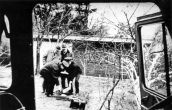
Investigator Eiþens Kakitis (in the middle) during a legal review.
Latvia State Archive of Film, Photography and Audiovisual Documents, arh. nr. 48469N. |
Investigator Eiþens Kakitis (in the middle) during a legal review. |
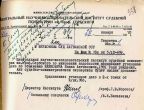
The January 28, 1970, cover letter from I. Yahimovich´s criminal case, signed by director G. Morozov and special section director V. Bakalyev, both of the Prof. Serbsk Central Institute for the Scientific Research of Court Psychiatry of the USSR Ministry of Health.
The letter indicates to the Latvian SSR Supreme Court that the court psychiatry expertise report will be sent separately. The employees of the institute determined Yahimovich's psychological condition based on information from the criminal case instead of actual facts about his health.
State Archives of Latvia 1986-2-10997-2, p. 338. |
The January 28, 1970, cover letter from I. Yahimovich's criminal case, signed by director G. Morozov and special section director V. Bakalyev, both of the Prof. Serbsk Central Institute for the Scientific Research of Court Psychiatry of the USSR Ministry of Health.
The letter indicates to the Latvian SSR Supreme Court that the court psychiatry expertise report will be sent separately. The employees of the institute determined Yahimovich's psychological condition based on information from the criminal case instead of actual facts about his health. |

The February 18, 1972, letter from S. Trapeznikov (director of the CPSU Central Committee's Scientific and Educational Institution Section) to the Central Committee of the CPSU titled “Regarding the state of national psychiatric assistance”. In the letter Trapeznikov suggests the formation of special psychiatric institutions under the jurisdiction of the USSR Ministry of the Interior for the long-term confinement of persons with “pronounced anti-social dispositions”. Trapeznikov indicated that citizens were complaining to the CPSU Central Committee about serious deficiencies in the provision of psychiatric care. In 1971 the majority of the 280,000 patients in psychiatric hospitals were located in insufficient, overcrowded, and unhygienic facilities, in which it was impossible to perform medical treatments.
On February 22, 1972, the CPSU Central Committee Secretariat sent this letter to a special commission organized by the USSR Council of Ministers for review.
The resulting special psychiatric institutions - which also held dissidents - were later transferred from the Ministry of the Interior to the jurisdiction of the USSR KGB.
Russian State Archive of Contemporary History 89-33-16, p. 2. Copy. |
The February 18, 1972, letter from S. Trapeznikov (director of the CPSU Central Committee's Scientific and Educational Institution Section) to the Central Committee of the CPSU titled “Regarding the state of national psychiatric assistance”. In the letter Trapeznikov suggests the formation of special psychiatric institutions under the jurisdiction of the USSR Ministry of the Interior for the long-term confinement of persons with “pronounced anti-social dispositions”. Trapeznikov indicated that citizens were complaining to the CPSU Central Committee about serious deficiencies in the provision of psychiatric care. In 1971 the majority of the 280,000 patients in psychiatric hospitals were located in insufficient, overcrowded, and unhygienic facilities, in which it was impossible to perform medical treatments.
On February 22, 1972, the CPSU Central Committee Secretariat sent this letter to a special commission organized by the USSR Council of Ministers for review.
The resulting special psychiatric institutions - which also held dissidents - were later transferred from the Ministry of the Interior to the jurisdiction of the USSR KGB. |
For quite some time graffiti criticizing the invasion of Czechoslovakia could be seen in the Latvian cities of Riga and Sigulda, but the KGB could not find who had done it. Then on June 16, 1969, the KGB of the Latvian SSR decided to bring a criminal case against Aldis Cilinskis, a worker at a print shop in Riga. From August 31, 1968, to May 1969 he had painted more than 19 inscriptions on various buildings, fences, bridges, and road surfaces. The inscriptions criticized the occupation of Czechoslovakia and expressed support for A. Dubchek's policies. With his inscriptions Cilinskis also turned against the occupation of Latvia and bid the occupants to leave both Czechoslovakia and Latvia. He put blood red paint on the hands and feet of a monument to Soviet soldiers and also splashed red paint on slogans glorifying the USSR.
Cilinskis attested his loyalty to his country in a written public invitation to mark November 18, the day the Republic of Latvia was proclaimed in 1918. On August 12, 1969, the KGB of the Latvian SSR decided to send Cilinkis' case to the court, with the intention of sentencing the young man to forced psychiatric treatment. Cilinskis was released from treatment only on February 28, 1973. He was rehabilitated by the Supreme Court of the Republic of Latvia in 1992.
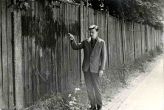
Aldis Cilinskis. Protested the occupation of Czechoslovakia in 1968-1969. In the photograph he is showing investigators from the Latvian SSR KGB the location of graffiti written in October 1968 protesting the occupation of Czechoslovakia.
State Archives of Latvia 1986-1- 45172-1, p. 66.
|
Aldis Cilinskis. Protested the occupation of Czechoslovakia in 1968-1969. In the photograph he is showing investigators from the Latvian SSR KGB the location of graffiti written in October 1968 protesting the occupation of Czechoslovakia. |

|
Cover sheet from the criminal case brought by the KGB of the Latvian SSR against Aldis Cilinskis. Cilinskis was prosecuted for his protest of the occupation of Czechoslovakia and Latvia. |

Excerpt from the Latvian SSR KGB watchman's report from August 31, 1968, regarding the anonymous graffiti “Russian occupants out of Czechoslovakia!” and “Long live Dubchek! Shame on the soviets!” It was later discovered that Aldis Cilinskis had written the graffiti.
State Archives of Latvia 1986-1-45172-1, p.187.
|
Excerpt from the Latvian SSR KGB watchman's report from August 31, 1968, regarding the anonymous graffiti “Russian occupants out of Czechoslovakia!” and “Long live Dubchek! Shame on the soviets!” It was later discovered that Aldis Cilinskis had written the graffiti. |

The February 28, 1973, decision by the Latvian SSR Supreme Court criminal court panel regarding the release of Aldis Cilinskis from forced psychiatric treatment. He was nevertheless still held in general treatment at the psychiatric hospital.
State Archives of Latvia 1986-1-45172- s.f., p. 33.
|
The February 28, 1973, decision by the Latvian SSR Supreme Court criminal court panel regarding the release of Aldis Cilinskis from forced psychiatric treatment. He was nevertheless still held in general treatment at the psychiatric hospital. |
In Latvia the resistance to the authorities was for the most part nonviolent. Although a few youths began to collect arms in response to the events in Czechoslovakia, most citizens expressed their opinions peacefully. On November 26, 1967 (Memorial Day), approximately 70,000 people visited Riga's Bralu kapi and Meþa kapi (Brothers' and Forest Cemeteries) and laid flowers on the graves of statesmen from the time of Latvia's independence. The Latvian Communist Party and the Latvian SSR KGB did everything possible to prevent something similar from happening on or around November 18, 1968, the 50th anniversary of the proclamation of the Republic of Latvia. However, on November 24, 1968, KGB agents again encountered people lighting candles on the grave of the first President of Latvia Janis Cakste. As a result, at least 13 youths were subjected to reeducation, and two were expelled from their schools.
In response to the events in Czechoslovakia several resistance groups were established in Latvia's technical and secondary schools. They demanded freedom of speech and condemned the occupation of Czechoslovakia and the domination of the Communist Party of the Soviet Union (CPSU). The youths also demanded the preservation of Latvian folk traditions.
Some individuals, such as former Latvian Social Democrat leader Fricis Menders, publicly voiced their opinions about Czechoslovakia in journalistic treatises. Factory workers shouted out in anger to each other about the occupation.
But the authorities could not allow the protests to continue, so they repressed the most active protesters.
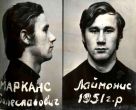
Laimonis Markans. After the events in Czechoslovakia, Markans protested against the foreign policies of the CPSU. This photo was taken after his arrest.
State Archives of Latvia 1986-1- 45170-1, p. 116.
|
Laimonis Markans. After the events in Czechoslovakia, Markans protested against the foreign policies of the CPSU. This photo was taken after his arrest. |
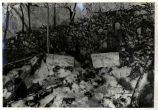
Leaflets prepared by Laimonis Markans and Valerijs Akks, both members of a youth resistance group in Latvia. The text reads “Freedom of speech and of the press!” The leaflets were located outside the Jekabpils Economics Technical College on the night of November 7, 1969.
State Archives of Latvia 1986-2-45170-1, p. 85.
|
Leaflets prepared by Laimonis Markans and Valerijs Akks, both members of a youth resistance group in Latvia. The text reads “Freedom of speech and of the press!” The leaflets were located outside the Jekabpils Economics Technical College on the night of November 7, 1969. |

The May 27, 1969, notice by Irena Reimane, secretary of Riga's Kirov district Communist Party committee, regarding the November 24, 1968, events in Riga's cemeteries. The notice was sent to the Riga party committee and tells of the repression of those youths who lighted candles on the grave of the first President of Latvia Janis Cakste in November 1968. The candles were red, white, and red and placed in the order of the colors on the Latvian flag. The authorities believed that the commemoration of the dead took place too soon after the 50th anniversary of the proclamation of the Republic of Latvia on November 18. The Communist Party of Latvia also condemned the commemoration of statesmen from the former Republic of Latvia. The party turned against 13 youths, two of whom were expelled from the Riga Polytechnic Institute.
State Archives of Latvia PA-106-39-9, p. 20.
|
The May 27, 1969, notice by Irena Reimane, secretary of Riga's Kirov district Communist Party committee, regarding the November 24, 1968, events in Riga's cemeteries. The notice was sent to the Riga party committee and tells of the repression of those youths who lighted candles on the grave of the first President of Latvia Janis Cakste in November 1968. The candles were red, white, and red and placed in the order of the colors on the Latvian flag. The authorities believed that the commemoration of the dead took place too soon after the 50th anniversary of the proclamation of the Republic of Latvia on November 18. The Communist Party of Latvia also condemned the commemoration of statesmen from the former Republic of Latvia. The party turned against 13 youths, two of whom were expelled from the Riga Polytechnic Institute. |
The authorities forbade people to visit the graves of former statesmen and deliberately did not attend to of the section of Riga's 2. Meþa kapi (Forest Cemetery No. 2) in which the first President of Latvia Janis Cakste (1859-1927) had been laid to rest. Some people nevertheless took the risk and placed flowers and lighted candles on Cakste's grave. In 1988, despite criticism from the authorities, employees of socio-political organizations finally cleared the trees that had been planted in front of Cakste's grave
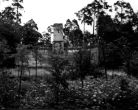
The neglected area in front of Janis Cakste's grave during the time of Soviet occupation.
State Archives of Latvia 2197-1-v-177, p. 47.
|
The neglected area in front of Janis Cakste's grave during the time of Soviet occupation. |

Fricis Menders (1885-1971), former chairman of the Latvian Social Democratic Party. After World War II Menders wrote several essays that were considered “anti-Soviet treatises” by the KGB and Supreme Court of the Latvian SSR. On November 3, 1969, Menders was convicted of anti-Soviet agitation and propaganda and sentenced to five years in exile.
State Archives of Latvia 1986- 2-8316-s.f., p.62.
|
Fricis Menders (1885-1971), former chairman of the Latvian Social Democratic Party. After World War II Menders wrote several essays that were considered “anti-Soviet treatises” by the KGB and Supreme Court of the Latvian SSR. On November 3, 1969, Menders was convicted of anti-Soviet agitation and propaganda and sentenced to five years in exile. |
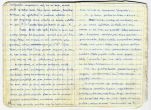
A fragment from the essay “Russian Imperialism and the Latvian People” by Fricis Menders, former leader of the Latvian Social Democratic Party. Paulis Lazda, a Latvian historian living in exile in the United States, rewrote the essay by hand in a notebook and attempted to smuggle it out of Latvia. However, the notebook was confiscated on the border in Tallinn. In the essay Menders criticized USSR policies by calling them Russian imperialism. Of the Soviet invasion of Czechoslovakia he wrote: “It is said that Russia did not act sensibly or wisely in Czechoslovakia. But there is one other thing we should not forget. People in Prussia used the phrase “Pferd, Frau und Zahnbürste” [German: horse, wife, and toothbrush] to describe with irony the intellectual limitations of Prussian cavalrymen. It would not be completely incorrect to say that that the average modern Russian “cavalryman” - the tank commander - does not stand far from that Wilhelmian Prussian.
On July 13, 1969, Paulis Lazda and his wife, Irena Lazda, were banished from the USSR and not allowed to return.
State Archives of Latvia 1986 – 1- 45164-4, pp. 73. o. p. 74.
|
A fragment from the essay “Russian Imperialism and the Latvian People” by Fricis Menders, former leader of the Latvian Social Democratic Party. Paulis Lazda, a Latvian historian living in exile in the United States, rewrote the essay by hand in a notebook and attempted to smuggle it out of Latvia. However, the notebook was confiscated on the border in Tallinn. In the essay Menders criticized USSR policies by calling them Russian imperialism. Of the Soviet invasion of Czechoslovakia he wrote: “It is said that Russia did not act sensibly or wisely in Czechoslovakia. But there is one other thing we should not forget. People in Prussia used the phrase “Pferd, Frau und Zahnbürste” [German: horse, wife, and toothbrush] to describe with irony the intellectual limitations of Prussian cavalrymen. It would not be completely incorrect to say that that the average modern Russian “cavalryman” - the tank commander - does not stand far from that Wilhelmian Prussian.
On July 13, 1969, Paulis Lazda and his wife, Irena Lazda, were banished from the USSR and not allowed to return.
|

Explosives, aviation shells, detonators, and ampules of poison seized Latvian SSR KGB from Gunars Ostrovskis, a member of a youth group established shortly after the events in Czechoslovakia.
State Archives of Latvia 1986-1- 45175-1, p.10.
|
Explosives, aviation shells, detonators, and ampules of poison seized Latvian SSR KGB from Gunars Ostrovskis, a member of a youth group established shortly after the events in Czechoslovakia. |
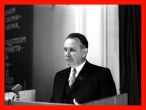
Longins Avdjukevics, director of the Latvian SSR KGB.
Latvia State Archive of Film, Photography and Audiovisual Documents, arh. nr. 46781N, photo by V. Belevics.
|
Longins Avdjukevics, director of the Latvian SSR KGB. |
In a report to the Central Committee of the Latvian Communist Party (LCP) on November 11, 1969, Longins Avdjukevics stated:
“The current international tension and ever-increasing anti-Communist propaganda against our nation from imperialist countries encourages the bourgeois nationalist activities of local Latvians. They are able to entice unstable youths to do various anti-social activities and crimes against the state...”
State Archives of Latvia PA-101-33-57, p. 64.

Photocopies of leaflets given to the KGB of the Latvian SSR for examination on December 3, 1969. The texts read: “Down with Communist propaganda!” “Freedom of speech and of the press!” “Don't interfere in the affairs of other countries!” The leaflets were prepared by Laimonis Markans and Valerijs Akks, who were convicted on February 4, 1970, of anti-Soviet agitation and propaganda.
State Archives of Latvia 1986-2- 45170 -2, p. 179.
|
Photocopies of leaflets given to the KGB of the Latvian SSR for examination on December 3, 1969. The texts read: “Down with Communist propaganda!” “Freedom of speech and of the press!” “Don't interfere in the affairs of other countries!” The leaflets were prepared by Laimonis Markans and Valerijs Akks, who were convicted on February 4, 1970, of anti-Soviet agitation and propaganda. |
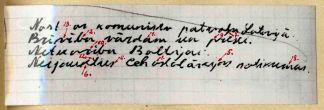
An appeal from Gunars Ostrovskis' youth resistance group: “Down with Communist unruliness in Latvia. Freedom of speech and of the press. Independence for the Baltic States. Don't interfere in the events in Czechoslovakia.”
State Archives of Latvia 1986-1- 45175-2, p. 197.
|
An appeal from Gunars Ostrovskis' youth resistance group: “Down with Communist unruliness in Latvia. Freedom of speech and of the press. Independence for the Baltic States. Don't interfere in the events in Czechoslovakia.” |

An excerpt from Gunars Ostrovskis' explanation to Major Petersons (the director of the Cesis section of the Latvian SSR KGB about the organization of the anti-Soviet group of which he was a member, the collection of arms, the listening to radio broadcasts from abroad, and the supporting of events in Czechoslovakia.
State Archives of Latvia-1986-1- 45175-1, p. 32. |
An excerpt from Gunars Ostrovskis' explanation to Major Petersons (the director of the Cesis section of the Latvian SSR KGB about the organization of the anti-Soviet group of which he was a member, the collection of arms, the listening to radio broadcasts from abroad, and the supporting of events in Czechoslovakia. |
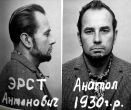
Photo by Anatols Ersts. Ersts was convicted by the Supreme Court of the Latvian SSR for anti-Soviet agitation and propaganda, including the condemnation of the occupation of Czechoslovakia.
State Archives of Latvia 1986-1- 45157-1, p. 143.
|
Photo by Anatols Ersts. Ersts was convicted by the Supreme Court of the Latvian SSR for anti-Soviet agitation and propaganda, including the condemnation of the occupation of Czechoslovakia. |

An excerpt from the transcript of the April 18, 1968, meeting of Latvian Communist Party (LCP) employees. The participants of the meeting discussed the positions agreed upon at the recent CPSU Central Committee general meeting in April. Like the participants at the April CPSU Central Committee meeting, the LCP employees also worried about the events in Czechoslovakia and the dissemination of “bourgeois ideology” in Latvia.
Yuri Andropov, the head of the USSR KGB and candidate for the CPSU Central Committee Politburo presented a lecture at the meeting. In the interests of secrecy, though, Andropov's lecture was not transcribed and is therefore not available in Latvia.
State Archives of Latvia PA-101-32-11, p. 3.
|
An excerpt from the transcript of the April 18, 1968, meeting of Latvian Communist Party (LCP) employees. The participants of the meeting discussed the positions agreed upon at the recent CPSU Central Committee general meeting in April. Like the participants at the April CPSU Central Committee meeting, the LCP employees also worried about the events in Czechoslovakia and the dissemination of “bourgeois ideology” in Latvia.
Yuri Andropov, the head of the USSR KGB and candidate for the CPSU Central Committee Politburo presented a lecture at the meeting. In the interests of secrecy, though, Andropov's lecture was not transcribed and is therefore not available in Latvia.
|
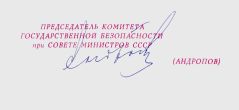
The signature of Yuri Andropov, the director of the KGB of the USSR.
The archives of the Center for the Documentation of the Consequences of Totalitarianism, Constitutional Protection Bureau of the Republic of Latvia. |
The signature of Yuri Andropov, the director of the KGB of the USSR. |

Notice from L. Studane (an instructor at Riga's LCP Kirov district committee) regarding the distribution of anti-Soviet leaflets by a student group at Riga's Secondary School No. 24. The group was established after students listened to radio news broadcasts from the West about the occupation of Czechoslovakia.
State Archives of Latvia PA-106-39-7, p. 135. The notice was written sometime after October 16, 1969.
|
Notice from L. Studane (an instructor at Riga's LCP Kirov district committee) regarding the distribution of anti-Soviet leaflets by a student group at Riga's Secondary School No. 24. The group was established after students listened to radio news broadcasts from the West about the occupation of Czechoslovakia. |
In the meeting, wich the LCP CC bureau hold on December 2, 1969, it focused on motives, leading to formation of schoolchildern antisoviet groups in several schools of Latvia. One of such groups was founded in Livani Secondary School No 1.The founders of the group werw motived by events in Czekoslovakia. Youngsters spread laflets appealing against Russification. The LCP CC bureau reprimanded tachers of the Livani Secondary School No 1 for letting pupils to discuss events in Czechoslovakia freely, without interference.
State Archives of Latvia PA-101-33- 30, pp. 7-8.
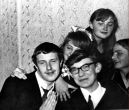
The pupils group of Livani Secondary school № 1. The founders of the group werw motived by events in Czekoslovakia:
Andrejs Michenkovskis (first from right),
Marite Vilcane (the second row, first from left),
Janina Kursite (the second row, first from right),
Aivija Uljanova (the third row) in 1969.
Janina Kursite`s personal collection.
|
The pupils group of Livani Secondary school № 1. The founders of the group werw motived by events in Czekoslovakia:
Andrejs Michenkovskis (first from right), Marite Vilcane (the second row, first from left), Janina Kursite (the second row, first from right), Aivija Uljanova (the third row) in 1969 |

The June 1969 draft of a decision by the Central Committee bureau of the LCP regarding the ideological political education of the students at the P. Stuèka State University of Latvia. The decision states that many instances of disrespectful behavior and a politically harmful mood have been observed at the university. Of particular note were the disturbances by students at Christmas 1968 during which incorrect political slogans were shouted and the attempted self-immolation of Ilya Rips on April 13, 1969.
State Archives of Latvia PA-101-33-5134, p. 93.
|
The June 1969 draft of a decision by the Central Committee bureau of the LCP regarding the ideological political education of the students at the P. Stuèka State University of Latvia. The decision states that many instances of disrespectful behavior and a politically harmful mood have been observed at the university. Of particular note were the disturbances by students at Christmas 1968 during which incorrect political slogans were shouted and the attempted self-immolation of Ilya Rips on April 13, 1969. |
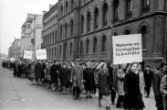
Students marching in a parade to mark the 50th anniversary of the State University of Latvia. In the foreground are students from the Department of History and Philology whose politically harmful opinions worried the LCP Central Committee bureau on several occasions in 1969.
Latvia State Archive of Film, Photography and Audiovisual Documents, arh. nr. 54646N. Photo by B. Tiknuss. |
Students marching in a parade to mark the 50th anniversary of the State University of Latvia. In the foreground are students from the Department of History and Philology whose politically harmful opinions worried the LCP Central Committee bureau on several occasions in 1969. |

Nikolajs Neilands, the editor-in-chief of the Foreign Editorial Office of the State Television and Radio Committee of the LSSR Council of Ministers (1968).
Latvia State Archive of Film, Photography and Audiovisual Documents,, arh. nr. 7971-I.
|
Nikolajs Neilands, the editor-in-chief of the Foreign Editorial Office of the State Television and Radio Committee of the LSSR Council of Ministers (1968). |
Nikolajs Neilands, the editor-in-chief of the Foreign Editorial Office of the State Television and Radio Committee of the LSSR Council of Ministers, at the April 24, 1968, meeting of the employees of Riga's Kirov district section of the LCP: “...I believe that if we had worked in the past with as wide a scope as we are working now, then definitely some of the students who went to Èakste's, Balodis', and Meierovics' graves last year would probably not have done so. The characters of those statesmen of bourgeois Latvia were so unpleasant, that, having known elementary facts about our history, the students would not have done so...”
State Archives of Latvia, 106. f., 38. apr., 11. l., 14.-15. lp.
|
|
